|
|
|
Sort Order |
|
|
|
Items / Page
|
|
|
|
|
|
|
| Srl | Item |
| 1 |
ID:
155790
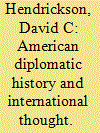

|
|
|
|
|
| Summary/Abstract |
This essay offers a constitutional perspective on the American encounter with the problem of international order. Its point of departure is the American Founding, a subject often invisible in both the history of international thought and contemporary International Relations theory. Although usually considered as an incident within the domestic politics of the United States, the Founding displays many key ideas that have subsequently played a vital role in both international political thought and IR theory. The purpose of this essay is to explore these ideas and to take account of their passage through time, up to and including the present day. Those ideas shine a light not only on how we organize our scholarly enterprises but also on the contemporary direction of US foreign policy and the larger question of world order.
|
|
|
|
|
|
|
|
|
|
|
|
|
|
|
|
| 2 |
ID:
155787
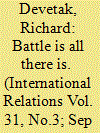

|
|
|
|
|
| Summary/Abstract |
There is an expectation today that International Relations (IR) theory ought to engage with philosophy as a meta-knowledge capable of grounding and legitimizing knowledge claims in the discipline. Two assumptions seem to lie behind this expectation: first, that only philosophy can supply the necessary meta-theoretical grounding needed; second, that theory is inherently a philosophical register of knowledge. This article treats these assumptions with scepticism. While not denying philosophy’s contribution to IR theory, the article makes the case for contextual intellectual history as an alternative mode of political and international theory. It seeks to shed light on the ‘philosophization of IR’ by depicting the broad contours of the historical and continuing rivalry between philosophy and history in the humanities and social sciences and, by reference to Machiavelli and Renaissance humanism, reminding the discipline of IR of the value of studying politics and international relations in a historical mode.
|
|
|
|
|
|
|
|
|
|
|
|
|
|
|
|
| 3 |
ID:
155786
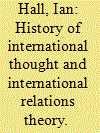

|
|
|
|
|
| Summary/Abstract |
Over the past two decades, historians of international thought have markedly improved our understanding of the disciplinary history of International Relations (IR) and its wider intellectual history. During that period, ‘contextualism’ has become a leading approach in the field, as it has been for half a century in the history of political thought. This article argues that while the application of contextualism in IR has improved our understanding of its disciplinary history, its assumptions about the proper relationship between historians and theorists threaten to marginalise the history of international thought within IR. It argues that unless the inherent weaknesses in contextualism are recognised, the progress made in the field will go unrecognised by a discipline that sees little reason to engage with its history. It suggests that historians of international thought adopt an extensively modified version of contextualism that would allow them to rebuild bridges back into IR, especially IR theory.
|
|
|
|
|
|
|
|
|
|
|
|
|
|
|
|
| 4 |
ID:
155791
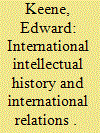

|
|
|
|
|
| Summary/Abstract |
This article reviews contextualist methods in intellectual history and discusses some of the specific challenges involved in their application to the study of International Relations (IR) and hence international intellectual history. While the broad thrust of these developments has been highly positive, the article argues that a distinction between classic and lesser works is a crucial part of the apparatus of the contextualist approach, which poses a problem in IR, where the idea of an established canon of great works has historically been less well developed than in the study of Political Theory or Law. As a result, the move towards contextualist methods of interpretation can force authors to restrict their focus onto a newly conceived, and somewhat narrow, canon, with a strongly political and legal flavour. The eclectic range of earlier, albeit less methodologically sophisticated, histories offer considerable resources for defining the scope of new empirical enquiries in international intellectual history, and the article concentrates on early modern journalism as an example of this opportunity.
|
|
|
|
|
|
|
|
|
|
|
|
|
|
|
|
| 5 |
ID:
155784
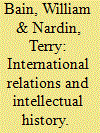

|
|
|
|
|
| Summary/Abstract |
The history of international thought has traditionally focused on a limited number of canonical texts. Such an approach now seems both naive and parochial. International Relations scholars often read their own ideas into these texts instead of getting ideas from them – ideas that if properly understood have the potential to undermine theirs. By ignoring non-canonical texts, we overlook resources that are not only necessary to establish the historical contexts of canonical writings but that can also help theorists of International Relations to understand their subject better. Judgements of what is and is not canonical are in any case themselves context-bound and contestable. Intellectual history can help us understand how the International Relations canon was constructed and for what purposes. It can also counter the abstractions of theory by reminding us not only that theories are abstractions from the activities of people living in particular times and places but also that our own theories are embedded in historicity. In these and other ways, paying attention to intellectual history expands the repertoire of ideas on which International Relations theorists can draw and against which they can measure their conclusions. The articles in this issue illustrate these points in relation to a wide range of texts and contexts. They suggest that whether one approaches international relations from the angle of description, explanation, policy or ethics, knowing how past thinkers have understood the subject can lead to better informed and more robust scholarship.
|
|
|
|
|
|
|
|
|
|
|
|
|
|
|
|
| 6 |
ID:
155788
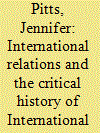

|
|
|
|
|
| Summary/Abstract |
Just as the contemporary global structure is a product of nineteenth-century economic and political developments, namely, industrial capitalism and global empires dominated by European metropoles, a misleading conception of the international system as composed of formally equal sovereign states is a product of the same period, as Vattel’s conception of states as equal moral persons was taken up and transformed in the early nineteenth century, especially in imperial Britain. This model continues to shape interpretations of global politics in International Relations (IR), despite the persistence of the imperial legacy in the form of a stratified globe. Historical work informed by postcolonial studies and recent scholarship in International Law can give IR greater analytical and critical purchase on the current global order.
|
|
|
|
|
|
|
|
|
|
|
|
|
|
|
|
| 7 |
ID:
155792
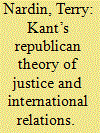

|
|
|
|
|
| Summary/Abstract |
Kant’s primary concern in writing on international relations is how to achieve ‘justice’ (Recht) between states. This means that instead of reading Kant as a theorist of peace or world government, as IR theorists have usually done, he is better read as a theorist international justice. His view of justice, which identifies it with a legal order that respects freedom as independence or nondomination, is broadly republican. But he equivocates on the possibility of justice at the international level, and this narrows what is usually seen as a wide gap between Kant’s thought and political realism. The paradox his uncertainty reveals is that it is wrong for states to remain in a lawless condition yet impossible for them to escape it so long as they remain independent. An international order cannot generate genuine law because there are no institutions to make, interpret, or enforce it. This means that states are entitled to determine their own foreign affairs. The gap between sovereignty and justice cannot be closed so long as these ideas are defined as they are within the state. The problem is not that a full, secure, and nonvoluntary system of justice that preserves the sovereignty of states is contingently unlikely. It is conceptually impossible. This conclusion poses a challenge to current theories of global justice.
|
|
|
|
|
|
|
|
|
|
|
|
|
|
|
|
| 8 |
ID:
155785
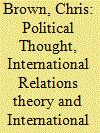

|
|
|
|
|
| Summary/Abstract |
The relationship between political theory, including the history of political thought, and International Relations theory, including the history of international thought, has been, and to some extent remains, complex and troubled. On both sides of the Atlantic, the mid-twentieth century founders of International Relations as an academic discipline drew extensively on the canon of political thought, but approached the subject in an uncritical way, while political philosophers largely disdained the international as a focus. This changed in the 1970s and 1980s, with the emergence of the ‘justice industry’ based on critiques of Rawls’ A Theory of Justice and a consequent recovering of the past history of cosmopolitan and communitarian thought. A new discourse emerged in this period – International Political Theory – bridging the gap between political thought and international relations and stimulating a far more creative and scholarly approach to the history of international thought. However, in a social science environment dominated by the methods of economics, that is, formal theory and quantification, the new discourse of International Political Theory occupies a niche rather than existing at the centre of the discipline.
|
|
|
|
|
|
|
|
|
|
|
|
|
|
|
|
| 9 |
ID:
155789
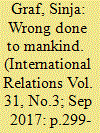

|
|
|
|
|
| Summary/Abstract |
Current debates on ‘crimes against humanity’ address its history and its potentially neo-imperial effects in international relations. In reference to these issues, this essay abstracts the idea of universal crime from the contemporary concept of ‘crimes against humanity’ and analyzes its mobilizations in early-modern perspectives on the legitimacy of European colonialism. First theorizing the easy union between notions of universal crime and arguments about European imperialism, I then draw on arguments by Vitoria, Gentili, and Grotius. I find that they rely on the idea of an offense injuring all mankind to negotiate colonial relationships between European powers and peoples abroad as well as between European powers vis-à-vis one another, both within Europe and in non-European spaces. The essay concludes by offering three venues for inquiry into the concepts of universal crime and crimes against humanity, namely their political productivity, their historical circulation, and their contemporary neo-imperial character.
|
|
|
|
|
|
|
|
|
|
|
|
|
|
|
|
|
|
|
|
|